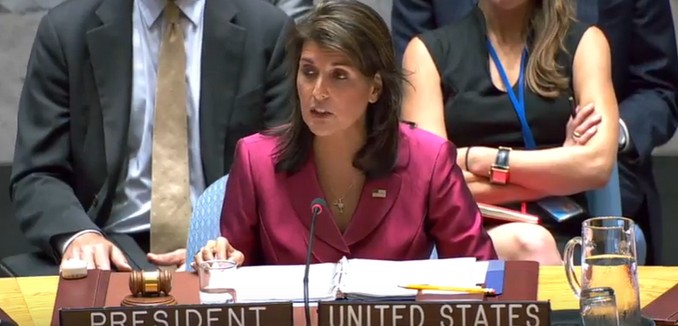“For almost 40 years, the Iranian regime has existed outside the community of law-abiding nations,” United State Ambassador to the United Nations Nikki Haley said at the opening of this week’s UN Security Council meeting on the Middle East. “It is difficult to name a conflict in the Middle East that does not have Iran’s fingerprints on it.”
In her speech, Haley reiterated a theme she has sounded since she was first appointed ambassador, that Israel, despite the disproportionate attention and condemnation it receives at the UN, is not the primary cause of turmoil in the Middle East.
While she acknowledged that the Israeli-Palestinian conflict is worthy of the Security Council’s attention, Haley asserted, “if there is one country that is the source of conflict and instability in the Middle East – one country that merits a quarterly debate in the Security Council – that country is not Israel. It’s Iran.”
Iran, Haley charged, “has trampled on the sovereignty of its neighbors,” including Syria, Lebanon, and Yemen. In particular, the ambassador pointed out that Iran has lately taken to preventing Iraq from asserting sovereignty over its own territory.
Iran recently fired ballistic missiles at the headquarters of the Kurdistan Democratic Party – Iran (KDP-I) and the Democratic Party of the Iranian Kurdistan (PDKI), as well as at a refugee camp for Iranian Kurds in Erbil, killing eleven people. Since this attack was by forces of Iran’s Islamic Revolutionary Guard Corps (IRGC), and not a proxy force, Haley observed, that it was “Iran’s first direct military strike into Iraqi territory in over a decade.”
Iran’s attempts to assert itself in Iraq involve violations of UN Security Council resolutions. The IRGC-Quds Force commander Gen. Qassem Suleimani is under a UN travel ban that was extended in Resolution 2231, which implemented the 2015 nuclear deal. Haley observed, however, that he “has practically taken up residence in Iraq since the May elections.” His goal, Haley said, is “to build an Iraqi government that is under the control of the Iranian regime.”
Iran, in recent weeks, has also used its proxies to attack U.S. interests in Baghdad’s secure Green Zone, and in the southern Iraqi city of Basra. Haley said that the administration would hold Iran “accountable” for the attacks on U.S. interests and personnel.
At the end of her remarks, Haley noted that respecting sovereignty of nations is an important part of the work done at the UN. Iran, however, she said, “is acting in shameless disregard of Iraqi sovereignty.”
Iranian violations of Iraqi sovereignty, she said, will destabilize Iraq just as Iran has done in “Syria, Yemen, Lebanon, and across the Middle East.” Haley concluded by calling on all those who support self-determination for the Iraqi people to “come to their defense.”
[Photo: U.S. Department of State / YouTube ]




